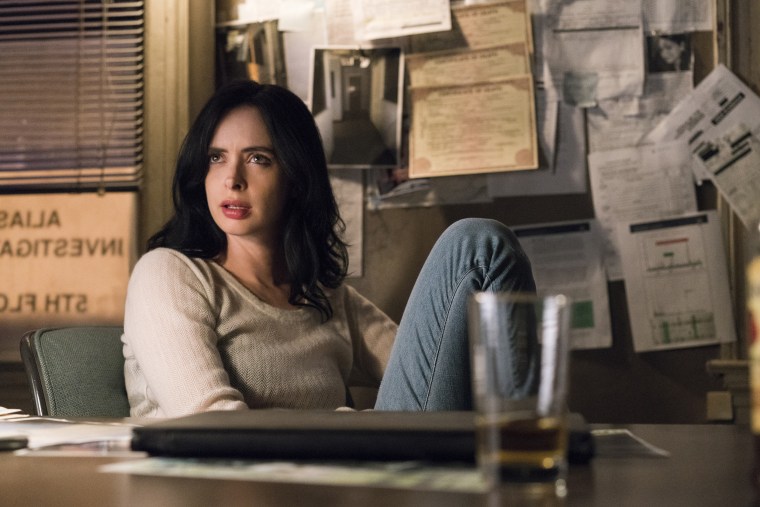After the first season's cathartic depiction of triumph over abuse, the second season of Netflix’s “Jessica Jones” is an anticlimactic mess. That's disappointing. But it's also, almost despite itself, meaningful. The aftermath of trauma doesn't resolve easily into closure. The first seasons' weight of abuse and violence hasn’t disappeared. Instead, it sits there, festering, while both characters and writers try to find a way to make sense of it.
The first season of “Jessica Jones,” airing in 2015, remains the strongest television endeavor that Marvel has managed thus far. David Tennant as the mind-controlling Killgrave is a terrifying villain, not because his abilities are so unlikely, but because he so realistically captures the dynamic of abuse. The embodiment of the patriarchy, Killgrave’s power allows him to invisibly manipulate everyone around Jessica (Krysten Ritter), corrupting her friends, influencing her lovers and weaving a nightmare of control and violence that becomes indistinguishable from her life.
When she finally uses her super strength to snap his neck, with the help of her foster sister Trish (Rachael Taylor), it's a cathartic celebration of sisterhood and feminist liberation. The series managed an affirmation of love and freedom which, contra most superhero victories, felt truly earned.
The aftermath of trauma doesn't resolve easily into closure. The first seasons' weight of abuse and violence hasn’t disappeared.
It's difficult to improve on a conclusion like that — and, sure enough, Netflix has been unable to follow it. Jessica Jones was mostly a side note in the (egregiously pointless) "Defenders" series, but the 13-episode second season also struggles to find its footing. The writers don’t seem to have managed to come up with an iconic villain to replace Killgrave. In fact, as of the fifth episode (the latest one available for preview) the main bad guy or girl remains shrouded in a vague conspiracy-theory mystery.
With the majority of the season still to come, Jessica has already spent time tangling with the cops, escaping, and then tangling with the cops once more. A character who died in the first season pops up and is immediately killed off again. We get multiple, lengthy expository discussions of how Trish’s radio show is sinking in the ratings. We get multiple expository discussions about how Jessica is pushing people away from her. There's an endless-feeling narrative thread about a rival detective agency. And so on. The first season's bleak, relentless focus dissipates into a fog of superfluous plot machinations.
And yet, despite the second season's hapless scrambling, the show retains an unsettling thematic weight. The confusion and uncertainty is partially just poor craftsmanship. But it also, half intentionally, reflects Jessica's own trauma.
Jessica killed Killgrave, but, as the second season shows, she didn't exactly defeat him. He's still in her head. "You're the weakest person I've ever known," one antagonist tells Jessica, and you can see his point. Krysten Ritter turns in another brilliant performance as a woman who knows she's broken, and knows that knowing doesn't change that fact. She drinks with a resigned determination, and is alternately amused and horrified by her inability to control her temper. She jokes about her promiscuity, even as her sexual encounters leave her obviously upset and miserable.
Even Jessica's victory over Killgrave ends up haunting her. She's consumed with guilt over killing him, and worries that she won't be able to stop herself from hurting other people. Killgrave felt no particular remorse for the violence he committed, but Jessica is crushed by the fear that in destroying her abuser, she may have turned herself into him. Part of the dynamic of abuse is that even escaping from it can end up perpetuating it.
And it's not just Jessica who still labors under Killgrave's influence. Abuse, misogyny and oppression shadow the other main characters on the show as well. Trish, we learn has a history of abuse as well. Jerri Hogarth (played with tightly wound malice by Carrie-Anne Moss) faces — and for that matter perpetuates — discrimination even as she makes speeches encouraging the next generation of strong women lawyers.
Jessica's main abuser is gone, but the series isn't. Jessica's life keeps grinding on, lubricated with alcohol and anger.
When Killgrave was alive, the cruelty, sadism and injustice of the patriarchy all seemed concentrated in one man. With him gone, it's not clear who Jessica and her allies should fight, or how they should go about doing so. Jessica's main abuser is gone, but the series isn't. The writers keep churning out dialogue, the (all-female) directors keeps moving the pieces from place to place, and Jessica's life keeps grinding on, lubricated with alcohol and anger.
So, is the show just a mess, or is it a mess with a point? Probably a little bit of both — and Ritter's charisma and tough-as-nails vulnerability keeps the series watchable even as it backtracks and loses its way. The second season of Jessica Jones isn't a tour-de-force, like the first was. But neither is life. Sometimes you win, and sometimes it feels like you are just try to get through the run-time.
Noah Berlatsky is a freelance writer. He edits the online comics-and-culture website The Hooded Utilitarian and is the author of the book "Wonder Woman: Bondage and Feminism in the Marston/Peter Comics, 1941-1948."
